The hunt for Mexico's disappeared
For years, as the deadly drug war has continued to rage, Mexico has turned a blind eye to its disappeared
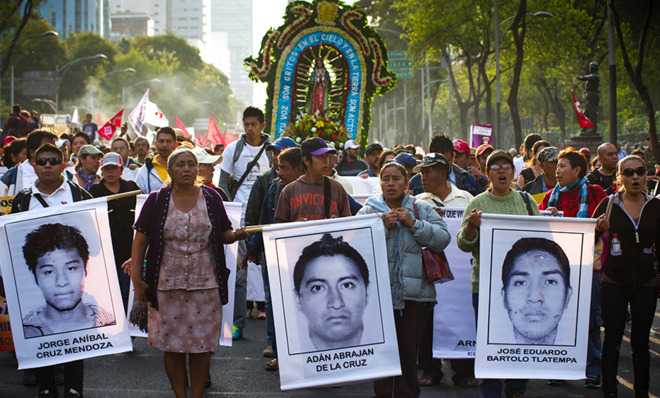
A free daily email with the biggest news stories of the day – and the best features from TheWeek.com
You are now subscribed
Your newsletter sign-up was successful

When his wife and three sons disappeared last year, Jorge Popoca was paralyzed with grief. But when it became clear that the police weren't conducting a real investigation, he says, anger took over. Now Popoca — a wiry farmer with a gruff voice — is determined to learn about the fate of his family and the dozens of others who in recent years have disappeared in southern Mexico.
Today the 41-year old, who lives in a village near Iguala, works for a group of local vigilantes, gathering tips and following leads into the hills surrounding the city. Over the past two months, Popoca and his cohorts have found dozens of clandestine graves where local gangsters appear to have buried their victims.
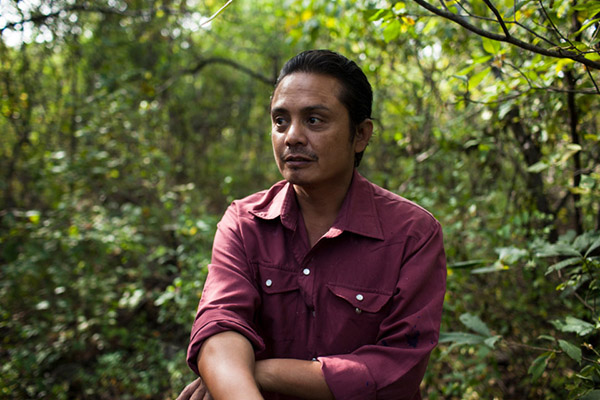
Jorge Popoca pauses while searching an area of clandestine graves near the city of Iguala. Popoca's wife and three sons were kidnapped, and he is looking for them, as part of a group of people who also have missing family members. Graves were discovered at this site last October and have yet to be excavated. | (VOCATIV/BRETT GUNDLOCK)
The Week
Escape your echo chamber. Get the facts behind the news, plus analysis from multiple perspectives.

Sign up for The Week's Free Newsletters
From our morning news briefing to a weekly Good News Newsletter, get the best of The Week delivered directly to your inbox.
From our morning news briefing to a weekly Good News Newsletter, get the best of The Week delivered directly to your inbox.
Yet it's the graves they haven't found that have made the biggest impact. In September, 43 students from a radical teachers college disappeared. The reason: The city's mayor allegedly ordered corrupt police officers to stop them from disturbing an appearance by his wife. So the cops allegedly handed them over to a local drug cartel, which many believe murdered the students.
For years, as the deadly drug war has continued to rage, Mexico has turned a blind eye to its disappeared. Over the past three years, more than 20,000 people have vanished in Mexico, according to the Mexican government. Most, human rights groups say, have been either kidnapped or killed by drug gangs or clandestinely imprisoned by corrupt members of law enforcement. And the real number of disappeared is likely far higher than the government has registered.
"The official numbers are not very reliable," says José Reveles, a retired crime reporter who has written numerous books about corruption and the drug war. "Even if they were, they don't include the tens of thousands of Central American migrants who disappeared in the last decade."
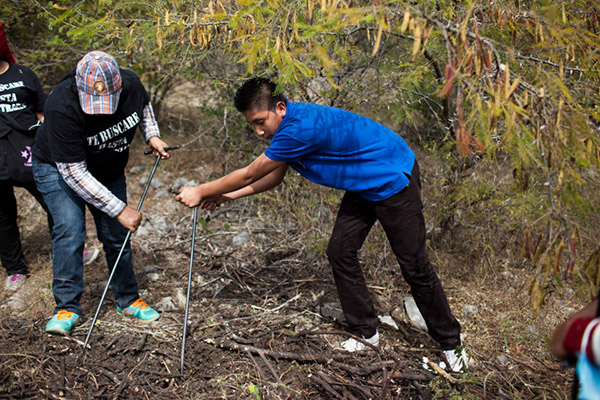
Family members of missing people search the mountains surrounding the city of Iguala for clandestine graves. | (VOCATIV/BRETT GUNDLOCK)
A free daily email with the biggest news stories of the day – and the best features from TheWeek.com
But Iguala has changed things — at least in the southern state of Guerrero. For months now, protesters here have taken to the streets, demanding that the president resign and that the authorities find the students and other missing people. The news has cast a spotlight on the country's disappeared and put pressure on President Enrique Peña Nieto to untangle the corrupt web linking organized crime to law enforcement.
That web is especially tangled here in southern Mexico, which for years has been a battleground for drug gangs. In Iguala, ex-Mayor José Luis Abarca and his wife, Maria Pineda, allegedly had strong ties to a group of narcos called the Guerreros Unidos. Locals say they've long lived in fear of armed convoys roaming the countryside, often accompanied by government officials and police officers. But few dared to speak out.
Last month the silence was broken as dozens of people from the city and surrounding villages gathered at the San Gerardo Church in Iguala. All had lost a friend or family member, but none knew what had happened to them. With the help of DNA donations from foreign universities, Popoca and his fellow vigilantes are setting up a victims database and trying to coordinate a search for the area's disappeared. At the least, they hope, hundreds will be able to finally know the fate of their loved ones and eventually move on.
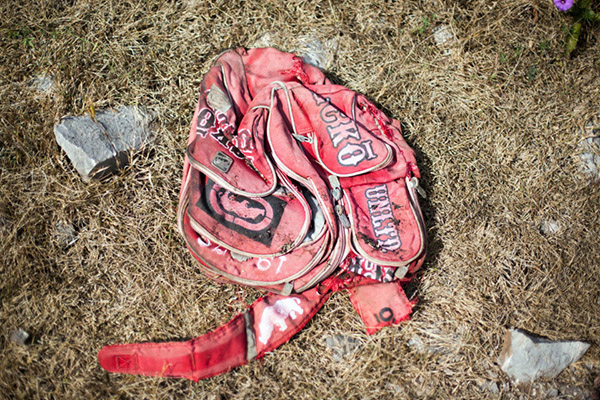
A disgraced backpack found, as family members of missing people search the mountains surrounding the city of Iguala for clandestine graves. Trash often alerts search parties to a potential gravesite. | (VOCATIV/BRETT GUNDLOCK)
Many of those at the church last month had never even spoken about the disappeared before. They'd been too afraid of the narcos and their friends on the police force. Many say local government officials had warned them not to search for their relatives. Sometimes, they say, even the officials themselves were too afraid to start an investigation.
Those same officials now seem more afraid of doing nothing than letting the status quo prevail. In recent months, with his approval rating plummeting, Peña Nieto has sent hundreds of federal police to Guerrero to look for the missing students. He even outlined a plan last week to combat corruption and put an end to the era of impunity for the police and their drug lord allies.
The vigilantes, however, aren't holding their breath. Those attending the church meetings say the federal police are patrolling the area, but their focus seems singular. (The authorities declined to comment on the matter). "They only care about the students case because it has hurt the image of the president," says Miguel Ángel Jiménez Blanco, who coordinates the search effort for the vigilantes. "The only way the other cases can ever be solved is if we, the people, conduct our own search."
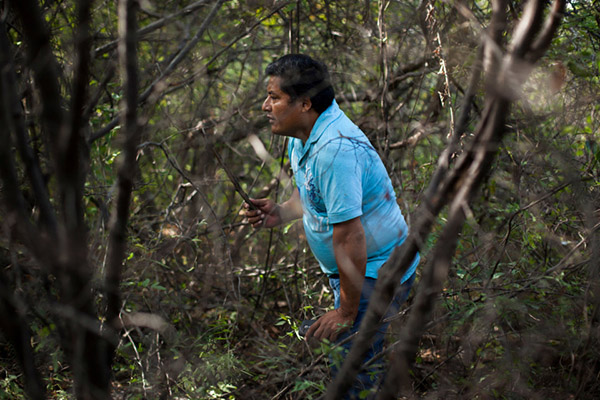
Miguel Ángel Jiménez Blanco searches an area of clandestine graves near the Mexican city of Iguala. | (VOCATIV/BRETT GUNDLOCK)
After years of living in fear, residents of Iguala and other towns in across southern Mexico are finally taking matters into their own hands. They feel they have no choice. As Popoca, the grieving father and husband puts it: "All I can do now is help others."
This article originally appeared at Vocativ.com: The hunt for Mexico's disappeared
More from Vocativ...
- ISIS plots balloon party in Saudi Arabia
- Uber banned in New Delhi after rape allegation
- An Iowa clinic is now providing 'abortion reversals'
-
 The environmental cost of GLP-1s
The environmental cost of GLP-1sThe explainer Producing the drugs is a dirty process
-
 Greenland’s capital becomes ground zero for the country’s diplomatic straits
Greenland’s capital becomes ground zero for the country’s diplomatic straitsIN THE SPOTLIGHT A flurry of new consular activity in Nuuk shows how important Greenland has become to Europeans’ anxiety about American imperialism
-
 ‘This is something that happens all too often’
‘This is something that happens all too often’Instant Opinion Opinion, comment and editorials of the day
-
 'Once the best in the Middle East,' Beirut hospital pleads for fuel as it faces shutdown
'Once the best in the Middle East,' Beirut hospital pleads for fuel as it faces shutdownSpeed Read
-
 Israeli airstrikes kill senior Hamas figures
Israeli airstrikes kill senior Hamas figuresSpeed Read
-
 An anti-vax conspiracy theory is apparently making anti-maskers consider masking up, social distancing
An anti-vax conspiracy theory is apparently making anti-maskers consider masking up, social distancingSpeed Read
-
 Fighting between Israel and Hamas intensifies, with dozens dead
Fighting between Israel and Hamas intensifies, with dozens deadSpeed Read
-
 United States shares 'serious concerns' with Israel over planned evictions
United States shares 'serious concerns' with Israel over planned evictionsSpeed Read
-
 Police raid in Rio de Janeiro favela leaves at least 25 dead
Police raid in Rio de Janeiro favela leaves at least 25 deadSpeed Read
-
 Derek Chauvin's attorney files motion for new trial
Derek Chauvin's attorney files motion for new trialSpeed Read
-
 At least 20 dead after Mexico City commuter train splits in overpass collapse
At least 20 dead after Mexico City commuter train splits in overpass collapseSpeed Read